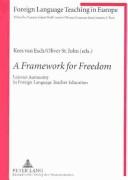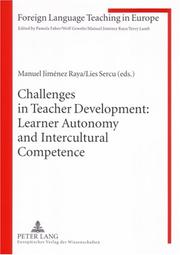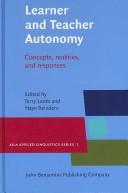| Listing 1 - 10 of 12 | << page >> |
Sort by
|
Book
ISBN: 013529603X 9780135296035 Year: 1991 Publisher: New York (N.Y.): Prentice Hall,
Abstract | Keywords | Export | Availability | Bookmark
 Loading...
Loading...Choose an application
- Reference Manager
- EndNote
- RefWorks (Direct export to RefWorks)
Language and languages --- Education --- Langage et langues --- Sciences de l'éducation --- Study and teaching --- Etude et enseignement --- Learner autonomy --- -Learner autonomy --- Autonomy (Education) --- Foreign languages --- Languages --- Anthropology --- Communication --- Ethnology --- Information theory --- Meaning (Psychology) --- Philology --- Linguistics --- Sciences de l'éducation --- Foreign language study --- Language and education --- Language schools --- Language and languages Study and teaching --- Language and languages - Study and teaching

ISBN: 0820459585 3631393733 Year: 2003 Volume: 8 Publisher: Frankfurt am Main ; New York : P. Lang,
Abstract | Keywords | Export | Availability | Bookmark
 Loading...
Loading...Choose an application
- Reference Manager
- EndNote
- RefWorks (Direct export to RefWorks)
Language teachers --- Language and languages --- Learner autonomy --- Multicultural education --- Professeurs de langue --- Langage et langues --- Autonomie de l'apprenant --- Education interculturelle --- Training of --- Study and teaching. --- Formation --- Etude et enseignement --- Foreign language study --- Language and education --- Language schools --- Intercultural education --- Education --- Culturally relevant pedagogy --- Autonomy (Education) --- Study and teaching --- Culturally sustaining pedagogy --- Language and languages Study and teaching
Book
ISBN: 9811020469 9811020485 Year: 2017 Publisher: Singapore : Springer Singapore : Imprint: Springer,
Abstract | Keywords | Export | Availability | Bookmark
 Loading...
Loading...Choose an application
- Reference Manager
- EndNote
- RefWorks (Direct export to RefWorks)
The book investigates interest groups and various learning circles, Reading Circles (RCs) learning opportunity in particular, as a mode of in-class and beyond class autonomous learning in the context of English Language Teaching (ELT) at tertiary level in Oman, and in similar contexts in the Middle East and North Africa (MENA) region. This investigation presents learners’ positive perceptions of learner autonomy and their readiness to adopt related practices. Building on findings from these RCs, the book introduces collaborative learner autonomy (CLA) as a novel concept of learner autonomy for use in educational contexts in the MENA region. As a concept of gradual development of learner autonomy, the CLA represents a new dynamic learner autonomy development process consisting of individual, competitive, collaborative, and autonomous stages. The CLA advocated in the book emphasizes the constructive role of teachers and educational institutions can play with other stakeholders in developing autonomy in their learners. The book also suggests that it is a shared responsibility that students, teachers, educational establishments, families, society and the educational systems should assume in a spirit of partnership.
Teaching and Teacher Education. --- Learner autonomy. --- Autonomy (Education) --- Education. --- Language and education. --- Teaching. --- Learning & Instruction. --- Language Education. --- Education --- Language and languages. --- Foreign languages --- Languages --- Anthropology --- Communication --- Ethnology --- Information theory --- Meaning (Psychology) --- Philology --- Linguistics --- Learning. --- Instruction. --- Didactics --- Instruction --- Pedagogy --- School teaching --- Schoolteaching --- Instructional systems --- Pedagogical content knowledge --- Training --- Educational linguistics --- Language and languages --- Learning process --- Comprehension
Book
ISBN: 9781137529985 1137529989 9781137529978 1137529970 Year: 2018 Publisher: London : Palgrave Macmillan UK : Imprint: Palgrave Pivot,
Abstract | Keywords | Export | Availability | Bookmark
 Loading...
Loading...Choose an application
- Reference Manager
- EndNote
- RefWorks (Direct export to RefWorks)
This book seeks to expand the research agendas on autonomy in language learning and teaching in diverse contexts, by examining the present landscape of established studies, identifying research gaps and providing practical future research directions. Based on empirical studies, it explores research agendas in five emerging domains: language learning and teaching in developing countries; social censure and teacher autonomy; learner autonomy and groups; learner autonomy and digital practice; and finally, learner autonomy and space. In doing so, it sheds new light on the impact of digital media, group dynamics and the application of ecological perspectives on learner autonomy. The contributors present a novel reconsideration of new learning affordances, and their discussion of spatial dimensions provides much needed expansion in the field. This book will have international appeal and provide an invaluable resource for students and scholars of second language learning and higher education, as well as teacher educators. Alice Chik is Senior Lecturer in Educational Studies at Macquarie University, Australia. Naoko Aoki is Professor of the Graduate School of Letters, Osaka University, Japan, where she teaches Japanese as a second language pedagogy. Richard Smith is a Reader and Associate Professor at the University of Warwick, UK. Chapter 2 of this book is open access under a CC BY 4.0 license via link.springer.com. .
Didactics of languages --- Linguistics --- talenonderwijs --- linguïstiek --- Learner autonomy. --- Language and languages --- Second language acquisition. --- Study and teaching. --- Second language learning --- Language acquisition --- Foreign language study --- Language and education --- Language schools --- Autonomy (Education) --- Education --- Applied linguistics. --- Language and education. --- Language and languages—Study and teaching. --- Applied Linguistics. --- Language Education. --- Language Teaching. --- Educational linguistics

ISBN: 3631558066 9783631558065 Year: 2007 Publisher: Frankfurt am Main Peter Lang
Abstract | Keywords | Export | Availability | Bookmark
 Loading...
Loading...Choose an application
- Reference Manager
- EndNote
- RefWorks (Direct export to RefWorks)
Interculturele competentie --- Lerarenopleiding. --- Onderwijs en opvoeding --- onderwijs. --- autonomie. --- Language teachers --- Learner autonomy --- Multicultural education --- Teacher-student relationships --- #KVHA: Taalkunde --- #KVHA: Vreemde Taalonderwijs --- Pupil-teacher relationships --- Student and teacher --- Student-teacher relationships --- Students and teachers --- Teacher and student --- Teacher-pupil relationships --- Teachers and students --- Interpersonal relations --- Intercultural education --- Education --- Culturally relevant pedagogy --- Autonomy (Education) --- Training of --- Culturally sustaining pedagogy

ISBN: 1282152351 9786612152351 9027291691 9789027291691 9027205175 9789027205179 9781282152359 6612152354 Year: 2008 Volume: 1 Publisher: Amsterdam: Benjamins,
Abstract | Keywords | Export | Availability | Bookmark
 Loading...
Loading...Choose an application
- Reference Manager
- EndNote
- RefWorks (Direct export to RefWorks)
This edited volume offers a cohesive account of recent developments across the world in the field of learner and teacher autonomy in languages education.
Language and languages --- Learner autonomy. --- Teaching, Freedom of. --- Autonomy (Education) --- Education --- Foreign language study --- Language and education --- Language schools --- Freedom of teaching --- Teacher autonomy --- Academic freedom --- Religious education --- Theology --- Toleration --- University autonomy --- Study and teaching. --- Study and teaching --- Learner autonomy --- Language and languages Study and teaching --- Language and languages - Study and teaching
Book
ISBN: 9882207162 1282709151 9786612709159 9888052543 9789888052547 9789622099234 9622099238 9789622099548 9622099548 9789882207165 9781282709157 6612709154 Year: 2009 Publisher: Hong Kong Hong Kong University Press
Abstract | Keywords | Export | Availability | Bookmark
 Loading...
Loading...Choose an application
- Reference Manager
- EndNote
- RefWorks (Direct export to RefWorks)
This volume brings together major contributions from the 2004 Autonomy and Language Learning: Maintaining Control conference and provides different critical interpretations of autonomy in second language education. Contributors include Naoko Aoki, Phil Benson, Sara Cotterall, Edith Esch, Terry Lamb, David Little, Phil Riley, Barbara Sinclair, Richard Smith and Ema Ushioda.
Teaching, Freedom of. --- Learner autonomy. --- Language and languages --- Freedom of teaching --- Teacher autonomy --- Academic freedom --- Religious education --- Theology --- Toleration --- University autonomy --- Autonomy (Education) --- Education --- Foreign language study --- Language and education --- Language schools --- Study and teaching. --- Study and teaching --- Language and languages Study and teaching
Book
ISBN: 9882209297 9888053914 9789888053919 9789888083640 9888083643 9789888083657 9888083651 Year: 2011 Publisher: Hong Kong [China] : Baltimore, Md. : Hong Kong University Press, Project MUSE,
Abstract | Keywords | Export | Availability | Bookmark
 Loading...
Loading...Choose an application
- Reference Manager
- EndNote
- RefWorks (Direct export to RefWorks)
Independent learning is not a new concept for language educators but while teachers, curriculum designers and policy makers have embraced it as underpinning modern notions of education, it remains a dynamic and vibrant field for researchers and academics who aim to broaden its scope and deepen our understanding of how it may be applied most effectively both inside and outside the classroom. The book's authors use their experience of applying the concepts related to independent learning in various geographical, cultural and pedagogical tertiary level learning contexts to present new perspectives on how independent learning can inform and support policy, teaching methodology, curriculum development and the nurturing of successful learners. While the first section of the book provides a view of the field from three broad curriculum development viewpoints, the remaining chapters primarily focus on the experience of learners, teachers and curriculum developers in applying principles of learner autonomy, self-regulation and self-direction with various types of learner--each with their own identities, motivations, expectations and goals. These learner and teacher stories provide insights that are important for an understanding of some of the impacts an independent learning approach to language learning have on learners in various educational contexts. This book will be of value to pre-service and in-service teachers, curriculum developers and teacher educators working in diverse educational contexts in more fully appreciating the contribution an independent learning focus can make to successful learning.
Learner autonomy. --- Independent study. --- Language and languages --- Foreign languages --- Languages --- Anthropology --- Communication --- Ethnology --- Information theory --- Meaning (Psychology) --- Philology --- Linguistics --- Modular approach in education --- Study, Independent --- Study skills --- Tutors and tutoring --- Universities and colleges --- Open learning --- Autonomy (Education) --- Education --- Study and teaching (Higher) --- Self-instruction. --- Honors courses
Book
ISBN: 9781614511359 9781501501081 9781614511960 1614511357 1501501089 1614511969 Year: 2015 Publisher: De Gruyter
Abstract | Keywords | Export | Availability | Bookmark
 Loading...
Loading...Choose an application
- Reference Manager
- EndNote
- RefWorks (Direct export to RefWorks)
The book explores the idea that pedagogy for autonomy requires the integration of teacher and learner development and can be enhanced through a case-based approach in teacher education. A case-based approach values experiential professional learning and expands professional competences necessary to promote autonomy in schools: developing a critical view of (language) education; managing local constraints so as to open up spaces for manoeuvre; centring teaching on learning; interacting with others in the professional community. Two strategies to implement the approach are presented and illustrated. The first one involves teachers in designing, implementing and evaluating experiences of pedagogy for autonomy, which are the basis for writing professional narratives and building a case portfolio. The second draws on teachers' pedagogical experience as the basis for the construction of case materials where experiential elements are combined with theoretical input and reflective tasks, so that the teachers who use those materials can reflect about and explore their own practice.
Language and languages --- Learner autonomy --- Study and teaching --- Autonomy (Education) --- Education --- Foreign language study --- Language and education --- Language schools --- Professeurs de langues --- Langues --- Formation. --- Orientation professionnelle. --- Étude et enseignement. --- Learner autonomy. --- Study and teaching. --- Language Education, Language Teaching. --- Language and languages Study and teaching
Book
ISBN: 9781783098606 Year: 2017 Publisher: Bristol Blue Ridge Summit
Abstract | Keywords | Export | Availability | Bookmark
 Loading...
Loading...Choose an application
- Reference Manager
- EndNote
- RefWorks (Direct export to RefWorks)
This is the first book on language learner autonomy to combine comprehensive accounts of classroom practice with empirical and case-study research and a wide-ranging engagement with applied linguistic and pedagogical theory. It provides a detailed description of an autonomy classroom in action, focusing on Danish mixed-ability learners of English at lower secondary level, and reports the findings of a longitudinal research project that explored the learning achievement over four years of one class in the same Danish school. It also presents two learner case studies to show that the autonomy classroom responds to the challenges of differentiation and inclusion, and two institutional case studies that illustrate the power of autonomous learning to support the social inclusion of adult refugees and the educational inclusion of immigrant children. The concluding chapter offers some reflections on teacher education for language learner autonomy. Each chapter ends with discussion points and suggestions for further reading.
Language and languages --- Learner autonomy. --- L2 education. --- L2 learning. --- L2 teaching. --- L2 teaching/learning. --- Language learner autonomy. --- SLA. --- classroom practice. --- dialogic/collaborative L2 learning. --- differentiation. --- inclusive pedagogy. --- language teacher education. --- learner autonomy. --- pedagogical theory. --- second language acquisition. --- LANGUAGE ARTS & DISCIPLINES / Study & Teaching. --- Foreign languages --- Languages --- Anthropology --- Communication --- Ethnology --- Information theory --- Meaning (Psychology) --- Philology --- Linguistics --- Autonomy (Education) --- Education --- Study and teaching (Secondary) --- differentiation .
| Listing 1 - 10 of 12 | << page >> |
Sort by
|

 Search
Search Feedback
Feedback About UniCat
About UniCat  Help
Help News
News